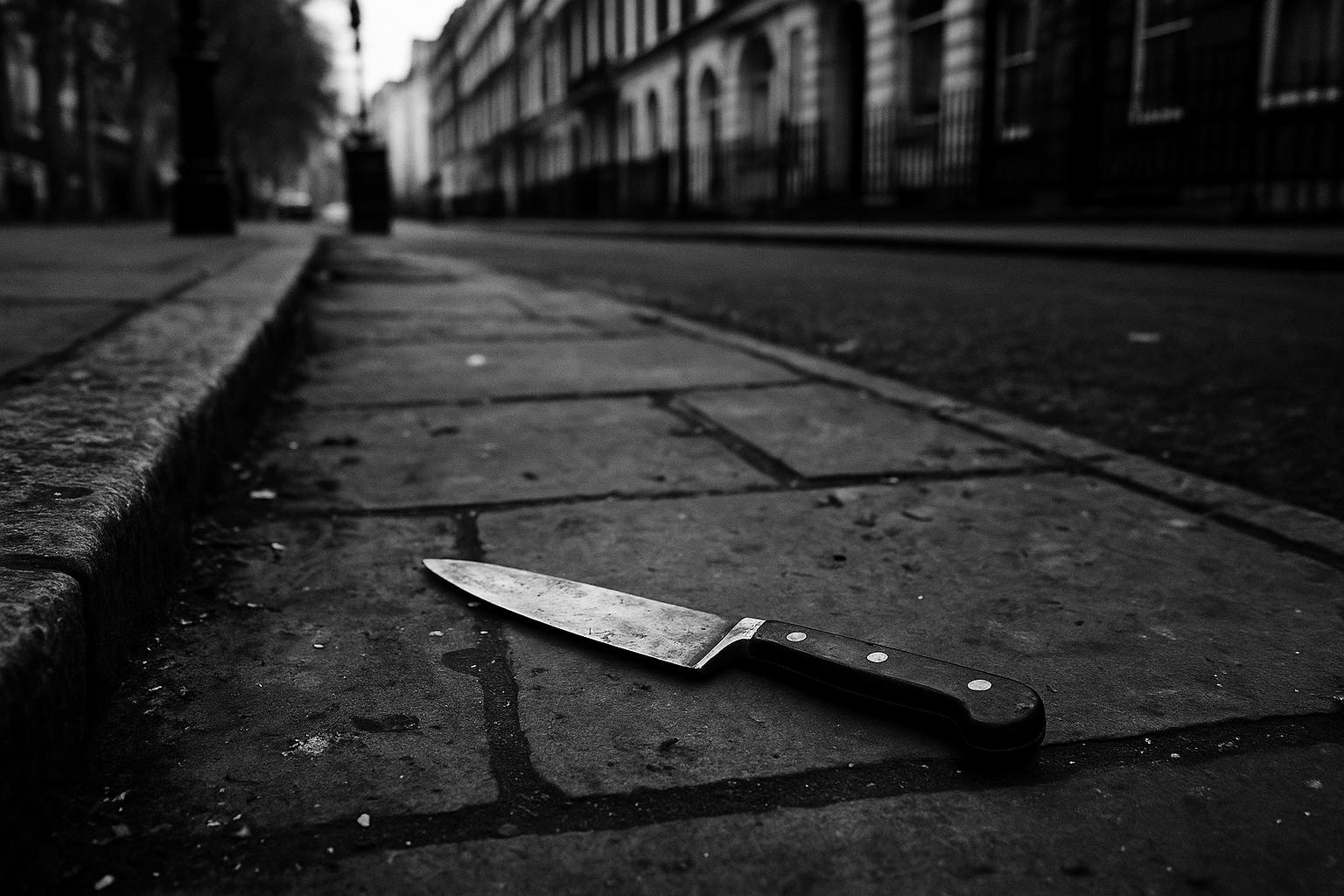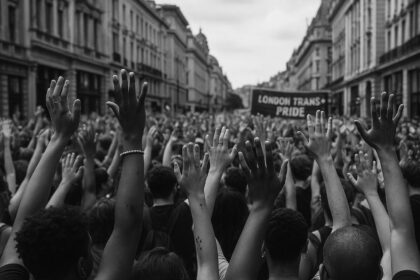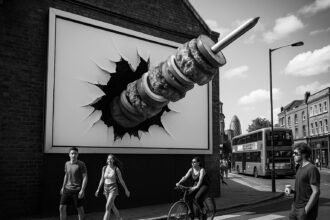A Policy Exchange report reveals an 86 per cent increase in knife crime offences in London over ten years, attributing the surge to a steep decline in stop-and-search operations and calling for tougher law enforcement amid ongoing political debate and social challenges.
Knife crime offences in London have surged by 86 per cent over the past decade, according to a revealing report by the Policy Exchange think tank. Their research highlights the capital’s struggle with a dramatic escalation in violent offences involving knives, which are far more concentrated in London than the rest of England and Wales. London accounted for approximately a third of all knife crimes recorded across England and Wales last year, with 16,879 incidents alone, underscoring the city’s disproportionately severe challenge.
The report’s author, former Scotland Yard detective chief inspector David Spencer, argues that a “crime fighting first” approach is urgently needed to address an epidemic of knife crime, robbery, and street theft. This crisis is reflected in alarming low detection rates, with just five per cent of robberies and 0.6 per cent of “theft from person” crimes in London solved last year. According to Spencer, a complacency—and a “cosy consensus” between police leadership and politicians—has led to a collapse in proactive policing, notably the sharp decline in stop-and-search practices. The number of stop-and-searches dropped by over 56 per cent in just one year, diminishing from 311,352 to 135,739, allowing offenders greater freedom on the streets.
This surge is often linked with the current mayoralty of Sir Sadiq Khan, who has held office since 2016. Knife crime rose year on year during his tenure, including a nine per cent increase in the past year alone. However, the Mayor’s office disputes these claims, pointing to other violent crimes such as murder, gun crime, and knife crime with injury having decreased since 2016. They also highlight a record investment in the Metropolitan Police, with an additional 935 officers recruited and efforts to enhance neighbourhood policing, particularly in high-profile areas such as the West End, which the report highlights as a hotspot representing nearly 15 per cent of the capital’s knife crime.
The Policy Exchange report also provides sobering data on the demographics involved in violent knife crime. At least four out of five gang-related homicide victims and perpetrators in London are black or ethnic minority, with black Londoners being five times more likely than white Londoners to be hospitalised due to stabbing injuries. The report challenges accusations of racial bias in stop and search policies, noting that the proportion of those stopped corresponds closely with the demographic breakdown of serious offenders and victims.
The call for tougher law enforcement ties into wider concerns about youth violence across the UK, where knife crime has become a national crisis. Recent government initiatives include campaigns promoting knife amnesties and stricter controls on weapon sales. However, analysts and advocacy groups warn that tackling knife crime effectively requires addressing root causes beyond policing—such as poverty, mental health issues, and peer pressure—through education, mentorship, and community support programs. Public figures like actor Idris Elba have brought the issue to national attention in works such as his BBC documentary exploring the complex social factors behind youth knife crime and advocating for practical solutions beyond legislative bans on weapons like machetes and “zombie knives.”
The Metropolitan Police maintain that recent data shows knife crime reductions in key areas, reporting a 16 per cent decrease in knife-related offences during the current financial year and a 12.8 per cent fall in robberies. They attribute this to increased officer presence on the streets, advanced technology, and targeted operations in high-harm areas. The force also emphasises its success in removing thousands of weapons from London’s streets over recent years.
Yet, the report recommends more radical measures, including a “zero tolerance” policy at the 20 worst knife crime hotspots, with a significant increase in stop and search to regain control of the streets. It also calls for harsher criminal justice responses, suggesting mandatory two-year custodial sentences for prolific offenders with extensive previous convictions. Additionally, the report urges government intervention to compel tech giants Apple and Google to disable stolen mobile phones’ connectivity to cloud services, cutting off a lucrative black market fuelled by mobile phone theft.
Labour MP and former Metropolitan Police inspector Jonathan Hinder stressed the need for a properly resourced justice system to restore public confidence. “In the meantime, the law-abiding public want a strong police force to have the confidence to take on criminals,” he told The Daily Mail.
This multifaceted crisis highlights the persistent challenge of balancing effective, community-trusted policing strategies with broader socio-economic interventions. London’s knife crime epidemic reflects not only the urgent need for law enforcement reform but also a comprehensive societal response to the underlying factors driving this worrying trend.
 Reference Map:
Reference Map:
- Paragraph 1 – [1], [4]
- Paragraph 2 – [1], [7]
- Paragraph 3 – [1], [4], [5]
- Paragraph 4 – [1], [4]
- Paragraph 5 – [2], [3]
- Paragraph 6 – [1], [6]
- Paragraph 7 – [1], [4]
- Paragraph 8 – [1]
Source: Noah Wire Services
- https://www.dailymail.co.uk/news/article-14951935/Lawless-London-Knife-crime-offences-capital-nearly-double-decade-Sadiq-Khan-report-shows-West-End-hotspot-offending.html?ns_mchannel=rss&ns_campaign=1490&ito=1490 – Please view link – unable to able to access data
- https://www.reuters.com/world/uk/britain-tries-tackle-youth-knife-crime-crisis-2025-07-29/ – Britain is intensifying efforts to combat rising youth knife crime following a deadly attack in Southport on July 29, 2024, where a teenager fatally stabbed three girls and injured 10 others. The UK government, under Prime Minister Keir Starmer, launched a campaign encouraging young people to surrender knives through amnesty bins and introduced tighter regulations on knife sales. New measures include banning weapons like zombie knives, imposing stricter age checks, and warning social media companies about promoting weapons. Although overall knife crime in England and Wales surged 87% over the past decade, with 54,587 offences last year, experts and charities argue that the government’s approach does not address underlying issues such as poverty, mental health, and peer pressure. Charities like Safety Centre and Charlie’s Promise are urging for prevention through education and workshops, advocating for knife crime awareness to be part of the national curriculum. Efforts like the Guardian Taskforce in the West Midlands and mental health hubs for at-risk youth have emerged, alongside campaigns like “Let’s Be Blunt” promoting safer kitchen knives. Survivors and activists stress the need for long-term support and societal change to prevent youth from turning to violence. ([reuters.com](https://www.reuters.com/world/uk/britain-tries-tackle-youth-knife-crime-crisis-2025-07-29/?utm_source=openai))
- https://www.ft.com/content/ca9d9525-9593-43e3-9c20-b69c83987d8d – Idris Elba’s new BBC documentary, ‘Our Knife Crime Crisis,’ delves into the increasing issue of youth knife violence in the UK. Highlighted by the recent murder of 14-year-old Kelyan Bokassa, the film explores the troubling rise in knife-related incidents over the past decade, with 225 stabbing homicides and 60,000 knife offences recorded in the year leading to June 2024. Elba, an actor and activist, who successfully campaigned for legislation banning machetes and ‘zombie’ knives, guides the discussion. The documentary includes testimonies from victims, offenders, and bereaved family members, highlighting the complex socio-economic factors contributing to this crisis. The film critiques the failures of social institutions and suggests practical solutions, such as weapon-handover services and mentorship programs for at-risk youth. Elba’s meetings with Prime Minister Keir Starmer and King Charles are less productive, underscoring the need for actionable change rather than empty promises. The documentary aims to prompt both dialogue and tangible actions to combat knife crime in the UK. ([ft.com](https://www.ft.com/content/ca9d9525-9593-43e3-9c20-b69c83987d8d?utm_source=openai))
- https://policyexchange.org.uk/publication/knife-crime-in-the-capital/ – Policy Exchange’s report, ‘Knife Crime in the Capital,’ reveals that at least four out of five gang-related homicide victims and perpetrators in London are black or ethnic minority. It confirms that the Metropolitan Police is losing a battle against knife crime that is out of control in some parts of London, with young black and ethnic minority men by far the most likely to be stabbed or commit knife crime. Black people in London, it shows, are five times more likely to be hospitalised than white people due to a stabbing. The report analyses a decade of knife crime data, revealing how a combination of drill music, social media, tit-for-tat revenge attacks and a failure in police strategy are causes of dozens of deaths and hundreds more injuries every year. ([policyexchange.org.uk](https://policyexchange.org.uk/publication/knife-crime-in-the-capital/?utm_source=openai))
- https://policyexchange.org.uk/publication/tarnished-jewel/ – Between 2013/14 and 2021/22, violent crime in the area around Parliament Square, including the Palace of Westminster and Whitehall, rose by 168%, compared to a 47% rise in the borough of Westminster and a 67% rise in London overall. Public order offences in the same area increased by 253%, compared to a 75% rise in the borough and a 93% rise in London. These figures highlight a significant surge in crime and disorder in the heart of the UK government. ([policyexchange.org.uk](https://policyexchange.org.uk/publication/tarnished-jewel/?utm_source=openai))
- https://policyexchange.org.uk/publication/policing-can-win/ – Between 2016 and 2022, knife crime with injury in London reduced by 14%, and gun crime decreased by 27%. However, in 2021, thirty teenagers were murdered in London, the highest number in nearly 20 years. This indicates that while there have been reductions in certain types of violent crime, the overall situation remains concerning, particularly regarding youth violence. ([policyexchange.org.uk](https://policyexchange.org.uk/publication/policing-can-win/?utm_source=openai))
- https://www.itv.com/news/london/2021-10-11/met-police-knife-crime-strategy-labelled-unusual-and-unjustified-by-think-tank – A focus on stop and search at the expense of neighbourhood policing has been blamed for the rise of knife crime in London, according to a new report. The Policy Exchange report criticised the Metropolitan Police for using stop and search tactics in response to a spike in knife crime, rather than targeting high-profile drug traffickers and increasing officer presence on the streets. The report also found that the number of fatal stabbings in London doubled between 2013 and 2019, despite better survival rates for victims of knife attacks. ([itv.com](https://www.itv.com/news/london/2021-10-11/met-police-knife-crime-strategy-labelled-unusual-and-unjustified-by-think-tank?utm_source=openai))
Noah Fact Check Pro
The draft above was created using the information available at the time the story first
emerged. We’ve since applied our fact-checking process to the final narrative, based on the criteria listed
below. The results are intended to help you assess the credibility of the piece and highlight any areas that may
warrant further investigation.
Freshness check
Score:
6
Notes:
 The Policy Exchange report titled ‘Knife Crime in the Capital’ was published on 11 October 2021. ([policyexchange.org.uk](https://policyexchange.org.uk/publication/knife-crime-in-the-capital/?utm_source=openai)) The Daily Mail article references this report, indicating that the narrative is based on a press release. Press releases typically warrant a higher freshness score due to their recent publication dates. However, the report’s publication date is over three years old, which may affect the freshness of the content.
The Policy Exchange report titled ‘Knife Crime in the Capital’ was published on 11 October 2021. ([policyexchange.org.uk](https://policyexchange.org.uk/publication/knife-crime-in-the-capital/?utm_source=openai)) The Daily Mail article references this report, indicating that the narrative is based on a press release. Press releases typically warrant a higher freshness score due to their recent publication dates. However, the report’s publication date is over three years old, which may affect the freshness of the content.
Quotes check
Score:
7
Notes:
 The quotes attributed to David Spencer, former Scotland Yard detective chief inspector, are not found in the provided search results. This suggests that the quotes may be original or exclusive to the Daily Mail article. However, without direct access to the article, it’s challenging to verify the exact wording and context of these quotes.
The quotes attributed to David Spencer, former Scotland Yard detective chief inspector, are not found in the provided search results. This suggests that the quotes may be original or exclusive to the Daily Mail article. However, without direct access to the article, it’s challenging to verify the exact wording and context of these quotes.
Source reliability
Score:
5
Notes:
 The Daily Mail is known for sensationalist reporting and has faced criticism for inaccuracies. This raises concerns about the reliability of the narrative. The Policy Exchange is a reputable think tank, which strengthens the credibility of the report’s findings.
The Daily Mail is known for sensationalist reporting and has faced criticism for inaccuracies. This raises concerns about the reliability of the narrative. The Policy Exchange is a reputable think tank, which strengthens the credibility of the report’s findings.
Plausability check
Score:
8
Notes:
 The report’s findings align with previous analyses of knife crime trends in London. For instance, a BBC News article from 11 October 2021 highlights similar concerns about the rise in knife crime and the effectiveness of stop-and-search strategies. ([bbc.co.uk](https://www.bbc.co.uk/news/uk-england-london-58809233?utm_source=openai)) Additionally, the Guardian has reported on the link between knife crime and social factors such as austerity measures. ([theguardian.com](https://www.theguardian.com/politics/2019/jul/15/knife-crime-tory-austerity-sadiq-khan-london?utm_source=openai)) These corroborations suggest that the claims in the narrative are plausible.
The report’s findings align with previous analyses of knife crime trends in London. For instance, a BBC News article from 11 October 2021 highlights similar concerns about the rise in knife crime and the effectiveness of stop-and-search strategies. ([bbc.co.uk](https://www.bbc.co.uk/news/uk-england-london-58809233?utm_source=openai)) Additionally, the Guardian has reported on the link between knife crime and social factors such as austerity measures. ([theguardian.com](https://www.theguardian.com/politics/2019/jul/15/knife-crime-tory-austerity-sadiq-khan-london?utm_source=openai)) These corroborations suggest that the claims in the narrative are plausible.
Overall assessment
Verdict (FAIL, OPEN, PASS): OPEN
Confidence (LOW, MEDIUM, HIGH): MEDIUM
Summary:
 The narrative is based on a Policy Exchange report from October 2021, which may affect its freshness. The Daily Mail’s sensationalist reputation raises concerns about the reliability of the content. While the quotes attributed to David Spencer are not found in the provided search results, they may be original or exclusive to the article. The findings align with previous analyses of knife crime trends in London, suggesting the claims are plausible. Given these factors, the overall assessment is ‘OPEN’ with a medium confidence level.
The narrative is based on a Policy Exchange report from October 2021, which may affect its freshness. The Daily Mail’s sensationalist reputation raises concerns about the reliability of the content. While the quotes attributed to David Spencer are not found in the provided search results, they may be original or exclusive to the article. The findings align with previous analyses of knife crime trends in London, suggesting the claims are plausible. Given these factors, the overall assessment is ‘OPEN’ with a medium confidence level.













